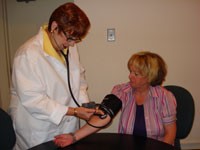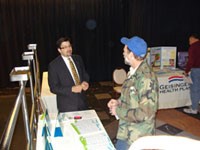
 Cincinnati, OH – When Metro Industries in Wilkes Barre, PA launched their health awareness program they hoped that good things would happen. But like any long-term, behavior-changing program, they figured that they payoff would be months - if not years - down the road. “The goal is to incent people to adopt healthy habits” says Benefits Manager Kim Graham. While that is indeed happening, the program has been extremely successful in the short term as well. In fact, for at least one employee it was a real life-saver. That’s because when the company arranged for a mobile ultrasound service to perform carotid artery and thyroid scans, one employee was a found to have some rather serious blockage.
Cincinnati, OH – When Metro Industries in Wilkes Barre, PA launched their health awareness program they hoped that good things would happen. But like any long-term, behavior-changing program, they figured that they payoff would be months - if not years - down the road. “The goal is to incent people to adopt healthy habits” says Benefits Manager Kim Graham. While that is indeed happening, the program has been extremely successful in the short term as well. In fact, for at least one employee it was a real life-saver. That’s because when the company arranged for a mobile ultrasound service to perform carotid artery and thyroid scans, one employee was a found to have some rather serious blockage.
“During the screening they suggested that he go immediately to the hospital because the carotid artery blockage was so advanced” recalls Graham. Another scan found nodules on an employees’ thyroid. Those nodules were later removed – and the employee, who was previously unaware of the problem, is healthy (and happy) once again.
Those kind of short-term results are not only extremely satisfying for Graham and her wellness team (and naturally to the employees involved), but they have also helped the program to spread throughout the rest of the companies facilities. Spreading the message via “word of mouth” has been very helpful in increasing employee participation – especially since this was one of the initial events.
How the program works
 The various programs are available to all of Metro’s plant and office personnel. Employees who participate in company sponsored workplace health programs and activities learn and earn. They learn why habits like walking, eating right and stopping smoking are healthier for them – and they earn custom coins. The custom health coins can be redeemed for prizes like water bottles, golf shirts, hats…even a day off. “Hopefully, these healthy habits will bring about a lifestyle change” continues Graham.
The various programs are available to all of Metro’s plant and office personnel. Employees who participate in company sponsored workplace health programs and activities learn and earn. They learn why habits like walking, eating right and stopping smoking are healthier for them – and they earn custom coins. The custom health coins can be redeemed for prizes like water bottles, golf shirts, hats…even a day off. “Hopefully, these healthy habits will bring about a lifestyle change” continues Graham.
The wellness committee meets regularly and determines which topic will be covered in each month. They also meet with their insurance carriers, to see what support materials and programs are available. Each month the advertising department produces posters to promote the monthly topics. The posters are then placed around the companies various facilities including plants and offices near the Wilkes Barre headquarters.
A letter from the company President introduced the program to Metro’s 500 local employees, and encouraged their participation. Weekly informational topics are distributed to the employees via the local intranet for those with computers and payroll stuffers to the plan employees. Keeping the message current with weekly reminders and fresh content (all related to the topic at hand) keeps employees engaged throughout the month.
The inaugural event was an online health risk assessment. Completing the assessment, which asked things like “how often do you exercise” and “how often do you eat fruits and vegetables”, earned employees “Get Healthy” coins.
More importantly it provides a benchmark for progress as employees can take the assessment twice annually. Ideally, the feedback from the semi-annual assessments will reinforce the healthy habits that are being adopted – and thus foster new ones.
One of the initial events was the carotid artery and thyroid scans mentioned earlier which were performed by a mobile ultrasound service. This well-timed event was clearly invaluable for the two employees whose lives are now changed as a result of the program. It was also helpful in proving the worth of the program to other employees – and thus enhancing employee participation.
All told about 180 employees participated in the screening – and earned their Healthy Habits coins. But more importantly, the success of the scans – and their role in saving an employee’s life – proved to employees the value of the program. Many employees who did not participate in the screening wished that they had. So much so that Graham figures that they’ll probably bring the mobile ultrasound team back to Metro’s facilities for another screening. Another sign that the program is achieving success.
Financial Rewards Help Too
Metro’s employees share in paying for their health care premiums. So adopting healthy habits may ultimately help them to drive down (or at least stabilize) spiraling insurance premiums. In fact, it may be helping already.
“We did have a good renewal premium this past year” recalls Graham. “The wellness program is in its infancy, so we could not determine if this was attributed to this initiative, but there are programs in place” says Graham “and we may be getting some benefit of those programs.” And that was a huge help in promoting the program to employees. Especially in these belt-tightening times, any programs to help drive down insurance premiums are welcomed. More importantly, the healthy habits being developed may be giving employees a better quality of life.
A Team Effort
Wellness is a team effort at Metro. There is a wellness committee comprised of employees from the offices and manufacturing plants which is responsible for developing the program and its components. They discuss agenda topics including future wellness topics as well as recaps of prior ones. Results are also discussed – as are ways to increase involvement and better the program on all fronts.
So far monthly topics have included heart month, nutrition, diabetes awareness, asthma & allergies, summer safety, cancer awareness, cholesterol awareness, healthy habits, safety awareness, and smoking cessation. Most employees can relate to the monthly topic – even if it does not pertain directly to them - if they do not smoke, chances are good that they know smokers, for example.
Each week a newsletter is produced and distributed electronically to employees with a computer, posted to an intranet site, and placed with weekly paychecks. Weekly items dovetail the monthly topic. For example, October’s weekly newsletters focused on driving safety, fire safety, respiratory care, and finished with Halloween safety.
Metro’s insurance carriers are also very involved in the wellness program. They attend monthly wellness committee meetings, share resources to promote the topics, and suggest events and activities like the carotid artery and thyroid screening. They have a vested interest in the success of the program. So they actively promote healthy habit programs – like smoking cessation and exercise. The carriers have offered to provide pedometers in conjunction with a walking program planned for the summer - because their research had indicated that walkers who use pedometers are more likely to walk further (and thus gain more benefit from the exercise).
The wellness program at Metro complements a regional program called “Steps to a Healthier PA.” Other local businesses also stress the importance of eating right, exercising, and not-smoking. Extolling the virtues of a healthy lifestyle has raised the awareness throughout he region – and has probably helped many employees to be more receptive to the programs messages. But while other companies are also stepping up their efforts at promoting a healthy lifestyle, the “Get Healthy” coins are unique to Metro.
These custom coins are awarded to individuals who adopt healthy habits. They are a short-tem reward to foster the long-term adoption of the healthy habit. Employees can earn a “Get Healthy” token by having the company nurse take their blood pressure each month. Participating in a weight management program like Weight Watchers also earns coins, as does enrolling in a gym or fitness center. Donating blood, learning First Aid/CPR, and having regular check-ups, eye-exams, dental check-ups and special screenings like mammograms or prostate exams all earn employees rewards. “Some people are diligent about bringing in their receipts and collecting their health coins,” says Graham.
Graham estimates that they’ve awarded at least a hundred coins a month when employees took a “health risk assessment” through the carriers. They are hopeful that this number will continue to rise as more employees participate. The program has been in place in the Wilkes Barre headquarters for over a year. In January an additional 700 or more employees were introduced to the program when it was rolled out worldwide.
Items available for “purchase” with the health coins include t-shirts, water bottles, golf shirts and bigger prizes. So far, most employees seem to be in a “savings mode.” The big prize that Graham believes employees will save for is a day off – which requires 75 coins – and likely several years of healthy living. Graham, however, is hopeful that saving for the day off will turn short-term behaviors into a lifestyle change. After all, she wants employees to enjoy their healthy days off – and continue to earn more of them.
.png)
